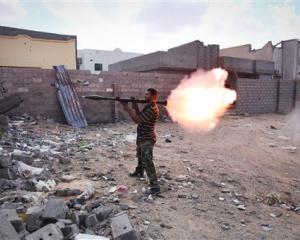In a less complex world, the death of Libyan strongman and dictator Muammar Gaddafi would be cause for optimism and relief. But the violent end of one of modern history's great tyrants leaves in its wake an open-ended future for his country.
The Libyan people may have shown great fortitude in their struggle against a brutal, self-serving and unjust regime; they have unburdened themselves of the yolk of oppression under which they have laboured for decades. But amid their celebrations, more sombre reckonings gather on the horizon.
For Libya, governed by a fickle, feudal and narcissistic dictator for more than four decades, has no tradition of democracy and none of its institutions. Gaddafi's legacy may yet prove to be a bitter struggle in the power vacuum left by his pervasive and corrupt regime.
It must be hoped this is not the case; that bravery and the desperate pursuit of a better, fairer society are rewarded with a kinder fate. For like others of his ilk - Saddam Hussein springs to mind - Gaddafi's legacy is writ large in blood. He ruled for 42 years following the overthrow of King Idris in 1969 and quickly acquired a reputation for eccentricity, ruthlessness and cruelty.
In Africa and the Middle East he appeared in a number of guises, appealing to pan-Arab and African identities. He routinely described himself as a Bedouin, a tribal leader, a revolutionary, a militarist - even a poet. He surrounded himself, as such megalomaniacs usually do, with craven yes-men, family members and tribal affiliates.
Colonel Muammar Gaddafi earned the undying contempt and anger of the world for his sponsorship of "state terrorism", arming the IRA, ETA and, in one of the most infamous terrorist acts of the modern era, for his regime's involvement in the 1988 Lockerbie bombing in which 270 innocent people died as Pan Am flight 103 fell from the sky over Scotland, victims all of a merciless - and pointless - bombing.
But he also had the capacity to reinvent himself and - with the connivance of the West, in particular then British prime minister Tony Blair and the United States - was rehabilitated following his supposed destruction of Libya's weapons of mass destruction programme in 2003. It helped that he had generous oil supplies to feed the developed world's voracious appetite. So there was more than a whiff of hypocrisy in the renewed venom with which the West once again began to describe him when Libya's own Arab Spring gained momentum in February this year.
Be that as it may, there is no doubt he was a dangerous and callous leader. It is hard, if not impossible, to refute the notion his country, if not the world, is all the better for his death. He leaves behind a nation in which the basic infrastructure is in a parlous state, and in which armed militias of various and incompatible loyalties vie for ascendancy.
Meanwhile, the West is calling for the formation of a united army and a democratically-elected government to succeed the National Transitional Council, which has a patchwork feel about it. That task is made momentously bigger by a dearth of institutional knowledge and civic leadership: there are no political parties, no real civil service, free speech is a figment in the Libyan imagination, and a widespread culture of patronage vies with one of tribal or family favouritism for power and influence.
If the portents for Libya are not necessarily all good, the death of Gaddafi sends a powerful message to those in his hemisphere who cling to unbridled power in the face of waves of spontaneous resistance. Libya has followed Tunisia and Egypt.
Gaddafi's demise will send a collective shiver up the spines of the powerful in Syria, in Yemen and possibly also in Iran, where the Arab Spring threatens to turn into a long and restless summer of discontent.
As for the West's relations with Libya: just as Nato has played a significant role - in fact a pivotal one - in disposing of the man once labelled by Ronald Reagan "the Mad Dog of the Middle East", it must now turn to assisting the country's transition to a democratic and just society. That may be much easier said than done.




